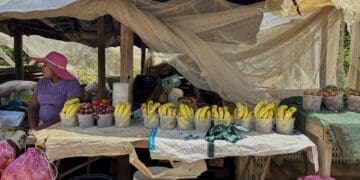By Noko Mashilo
The launch of the summer planting season in the Vhembe District by Limpopo premier Dr Phophi Ramathuba represents a pivotal initiative aimed at strengthening local agriculture and empowering rural communities. This event underscores the government’s dedication to sustainable food production by encouraging backyard farming and providing farmers with essential resources to support their growth.
The initiative seeks to empower rural households by enabling them to cultivate their own crops, ensuring food security, and fostering economic independence. Through this programme, the premier envisions enhanced livelihoods, job creation, and the upliftment of the socio-economic status of Vhembe’s communities. The summer planting season is a step in addressing poverty and driving agricultural development in Limpopo while promoting self-reliance among rural residents. “Agriculture is the lifeblood of Limpopo, driving economic growth, ensuring food security, and uplifting rural communities,” said Ramathuba.
She emphasised that the province, blessed with abundant natural resources and a committed agricultural workforce, has the potential to not only become South Africa’s agricultural hub but also emerge as a leader across the African continent. The premier highlighted the importance of food security beginning at home, advocating for backyard farming as a practical and impactful approach to addressing food insecurity. “
Backyard farming allows households to cultivate fresh vegetables, fruits, and herbs, ensuring a reliable supply of nutritious food,” she said. This practice, she added, reduced reliance on purchased food, mitigated vulnerability to market price fluctuations and ensured access to essential nutrients for low-income households. Ramathuba further encouraged the integration of modern agricultural technologies into backyard farming. “Innovations like vertical gardens, hydroponics, and aquaponics can significantly enhance yields, even in limited spaces,” she noted.
Acknowledging the challenges faced by small-scale farmers, the premier described them as the backbone of Limpopo’s agricultural sector. However, many farmers encounter barriers such as limited market access, financing, and modern farming tools. To address these issues, her government is focused on establishing and strengthening value chains that connect smallholder farmers to local, national, and international markets.
Infrastructure development plays a vital role in this transition. “Investments in irrigation systems, storage facilities, and transportation networks are crucial for enabling farmers to scale up production and deliver their goods efficiently,” said Ramathuba. The premier highlighted the Agricultural and Agro-processing Master Plan as a roadmap for realising Limpopo’s agricultural vision. It prioritises strengthening value chains, promoting export-oriented agriculture, and fostering public-private partnerships.
“We are focusing on investments in agro-industrial parks, export zones, and research and development centres to position Limpopo as a leader in agricultural innovation,” she explained. Ramathuba also stressed that Limpopo’s agricultural ambitions extended beyond South Africa’s borders. Achieving this vision, however, required collaboration. “Partnerships between government, the private sector, farmers, and research institutions are essential to driving innovation and ensuring sustainable growth,” she stated.
The premier acknowledged ongoing challenges affecting agriculture, including climate change and land degradation. Also, there was urban encroachment that threatened the sustainability of farming practices. However, she said that through strategic planning and collective effort, she remained committed to overcoming these obstacles and positioning Limpopo as a benchmark for agricultural excellence.































































